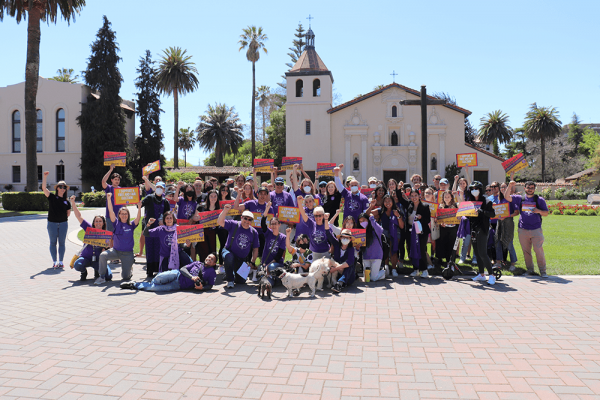After five years of organizing, the adjunct and lecturer faculty at Santa Clara University voted to form a union on June 21.
“A lot of the things that we’re asking for are driven by the Jesuit values of the university,” Andy Wolfe, who has been an adjunct lecturer at Santa Clara University for nine years, told Sojourners. “The Jesuits have a commitment to workers’ rights, to the dignity of work, to having employees have a voice, and we weren’t seeing it.”
In the midst of a pandemic, inflation, and widespread employee burnout, unions are on the rise and workers at Catholic universities are leaning on the church’s pro-union teachings for support. SCU, a Catholic Jesuit university in California’s Bay Area, is among other Jesuit universities celebrating recent union wins, including dining workers at Loyola University Chicago and graduate students at Georgetown University in Washington, D.C.
SCU’s adjunct and lecturer faculty unionized under the Service Employees International Union 1021 which represents over 60,000 employees in local governments, nonprofit agencies, health care programs, and schools throughout Northern California.
At SCU, adjunct and lecturers told Sojourners they have several concerns that motivate their union efforts, which began in 2017. Job security is one concern: Full time adjunct lecturers are usually hired for one year at a time and must reapply to their position each year. Low-pay is another issue the union hopes to address: Organizers told Sojourners that many of the adjunct and lecturers could not pay rent in one the most expensive cities in California.
Adjunct and lecturer faculty also told Sojourners that previous channels set up to communicate with the university were no longer working and lacked transparency. Wolfe said when the COVID-19 pandemic began, the university cut retirement benefits for adjunct and lecturers with no notice.
“The union effort really picked up and got a lot of support (after benefits were cut),” he said.
Some organizers told Sojourners they wanted a union to enforce good-faith discussions with the university. Deirdre Frontczak, a lecturer at Santa Clara University who has taught at the school since 2007, wrote in an email that she was disappointed with some of SCU’s decisions to engage in union busting. Frontczak said that SCU sent mailers to faculty arguing that a union would place “Jesuit community values” at risk, held mandatory anti-union meetings, and hired Littler Mendelson — an anti-union law firm that Starbucks and Apple both hired to combat union drives.
SCU declined to answer Sojourners’ questions about union busting, retirement cuts, or low wages. “As we move forward, Santa Clara University remains committed to building a world-class university where all colleagues can build meaningful careers and share in our Jesuit mission,” a university spokesperson told Sojourners in a statement.
Frontczak has a long track record with Jesuit education: she received her doctorate from Boston College, a masters from SCU’s Jesuit School of Theology, and has also taught at Boston College, Georgetown, and the University of San Francisco — all Jesuit universities.
She said that a Jesuit university that values “shared governance,” works for social justice, and follows Catholic teachings on the “preferential option for the poor” ought to include non-tenured faculty like her in setting policy and budgets.
“Working on a union campaign presented a challenge to my faith — not in the sense that it called it into question, but in the sense that it called into question the Catholicity of the employer whose students I serve,” she said. “From my point of view, speaking out to uphold worker rights is part of our calling and obligation, and as a professor of business ethics I take this obligation quite seriously. How could I possibly claim that role, if in fact I am complicit in an institution that systematically disempowers and disenfranchises an ever-increasing sector of its own workers?”
In recent years, the pandemic complicated union organizing efforts as did the Trump administration: In the name of religious freedom, the Trump-appointed head of the National Labor Relations Board ruled that employees at religious universities fulfilling a religious role could not be protected by labor laws. In late 2021, the Biden administration reversed the ruling.
“We believe we were the first ones to come back under the current administration and say hey, nobody in our bargaining unit has a church related role. So, we should be treated like secular employees, and the university did not oppose that,” Wolfe explained.
Moving forward, the union will elect a bargaining committee composed of quarterly adjuncts, yearly adjuncts, and term lecturers. The union will also discuss beforehand what issues they want to prioritize in negotiations. This committee will then represent the union in negotiations for a contract with the university; the process that can take anywhere from a few months to a year.
Madeline Cronin, a lecturer who has been part of the organizing efforts the last five years, said that community building was crucial to the union’s win.
Cronin, a Catholic, grew up around the Hartford Catholic Worker in Connecticut, said the lay community organizing they did on campus was consistent with Ignatian values — which include integrity, courage, love, service, and justice — named after St. Ignatius of Loyola, founder of the Jesuits.
Wolfe and Cronin detailed that many students and full-time faculty expressed solidarity with the adjunct and lecturers. Organizers held rallies on campus, hosted speakers, and passed out union-themed shirts and pins. Organizers also worked with the student government to pass labor policy, and with the faculty senate to garner support.
“One of the things I learned along the way is that the relationship building that we did five years ago is just as relevant to the work that we’re going to be doing in negotiating contracts in the future. It’s never wasted work to be building those relationships with each other as faculty,” Cronin said.
Cronin’s biggest advice for those thinking of forming a union: talk to others.
“Remember that the union is us, and build up that ‘us,’” she said.
Correction: The original version of this story incorrectly stated that Deirdre Frontczak has taught at SCU since 2014, she has taught at the university since 2007. The article was updated on July 14 at 1:45 p.m.
Got something to say about what you're reading? We value your feedback!








